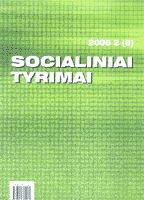Posocialistinių šalių nedarbo specifika
Unemployment Specificity in Post-Socialist States
Author(s): Audronė Rimkevičienė, Dovilė RuplienėSubject(s): Social Sciences
Published by: VšĮ Šiaulių universiteto leidykla
Keywords: Post-socialist states; unemployment; Caballero-Hammour theory.
Summary/Abstract: Under the command economy unemployment problems did not exist in Lithuania and other Eastern and Central Europe countries for more than 50 years. During the last decade the states experienced the huge growth of unemployment what was the result of socio-economic transformation processes. During the transition period from command to market economy different countries had different unemployment growth rates as it is impossible to avoid unemployment. Specific theories analyzing unemployment in these countries were developed and their effect was verified in order to find an explanation of this phenomenon. The aim of the article is to discuss theories which explain unemployment in the transient economy countries and to evaluate their adequacy in an unemployment rate research in Lithuania. Research methods include scientific literature analysis, synthesis, systematization and statistical data analysis. This article provides specific factors which determine unemployment growth in po-socialist countries and presents the such theories as the optimal speed of transition and Caballero-Hammour theory which explain this phenomenon. The general idea of the both theories is that unemployment dynamics depends on labour force reallocation from public to private sector. The application of the optimal speed transition theory is difficult for explanation of the country’s unemployment. Firstly, although data indicate that the number of employed in public sector is not from declining and job creation stops, it is complicated to draw unambiguous conclusions as just then it was a crisis in Russia. Secondly, during the analyzed period labour force volume was fluctuating in Lithuania and it highly complicates the application of the optimal speed transition theory.
Journal: Socialiniai tyrimai
- Issue Year: 2006
- Issue No: 8
- Page Range: 114-118
- Page Count: 5
- Language: Lithuanian

